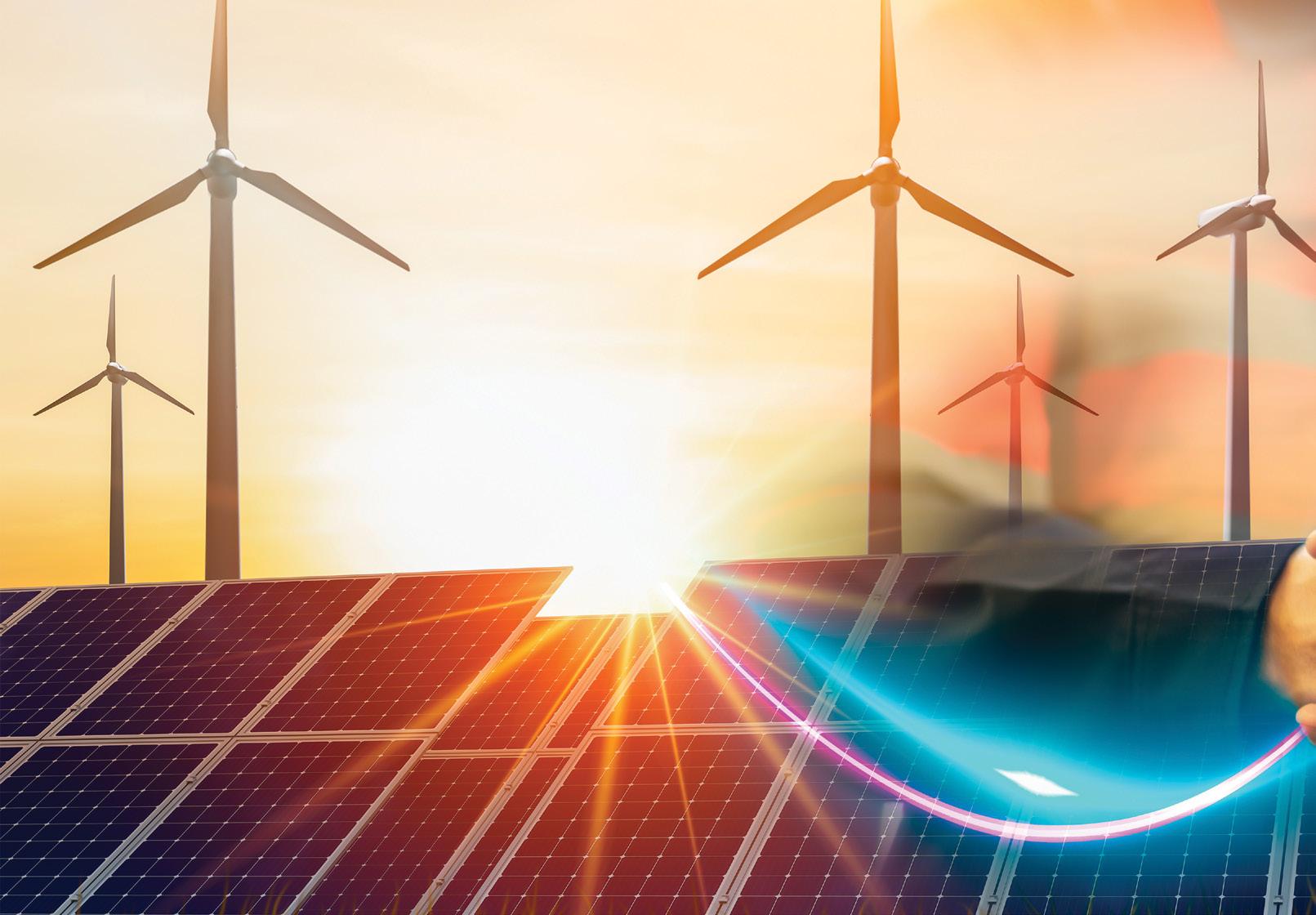
13 minute read
The Great Green Reset Scam
By: Tom Shepstone
If you want to understand what’s happening in the world, and specifically, the world of energy, one needs only to watch what elites do as opposed to what they say. By this, I’m not talking about their hypocrisy. We do far too much of that, which accomplishes precisely nothing. This is because elites are proud of their hypocrisy; it demonstrates they are so important as to be above the rules. Focusing on it simply throws us off the real scent, which is one of implicit corruption. It is endemic throughout the world’s ruling class, and that’s what we need to understand and defeat if we want the benefits of shale gas to be fully enjoyed.
Advertisement
There is a fascinating example of what I’m talking about. It is a report from a foreign group called Reclaim Finance. It is all about what big banks are doing, as opposed to what they’re saying about global warming. It is the work of extremists who say this is their mission:
Reclaim Finance was founded in March 2020 with one simple mission: making finance work for the climate. Since then, we have grown from strength to strength, expanding our team as we strive to shift the world’s largest financial institutions away from fossil fuels…
Our team, directed by Goldman prize winner Lucie Pinson, has backgrounds in a variety of sectors – such as finance, public administration, non-profits and law – and is united by our desire for a financial system working for people and the planet. Headquartered in Paris, we have employees around the world from London to California.
Our staff team is supported by an experienced Board of Directors, who have together spent more than 60 years working in NGOs on environmental and climate finance issues.
Notice the emphasis on “climate finance.” While the goal is conveyed superficially as one of denying capital for exploration and development of shale gas and other fossil fuels, there is already the implicit intention to finance “green energy” replacements. That is to say, Reclaim Finance is part of the plan for someone — namely elites — to rob trillions in green rent from ratepayers and taxpayers, using big banks to finance the thievery for big returns themselves.
Who is paying for this? The answer, as usual, is behind several doors. Reclaim Finance, and the report itself, was financed by private foundations, including one called the Sunrise Foundation. A quick visit to its website and its annual reports shows it is, in turn, funded by a third NGO called the Oak Foundation. It has funded, in a big way, organizations such as Rockefeller Philanthropies, 350.org (another Rockefeller outfit), the Duke University Nicholas School (producer of anti-fracking junk science), the NRDC (more Rockefeller), the Energy Foundation (majorly funded by solar investor Nat Simons) and Tides (Teresa Heinz Kerry’s non-profit political money laundering operation). Every one of these is anti-fracking.
But, that’s not the most important thing here. These two items from Influence Watch‘s report are what are really significant:
• In 2018, Oak gave $1 million to ClimateWorks Foundation “to support the greening of the Belt and Road Initiative,” a global trade infrastructure project pushed by Chinese leader Xi Jinping to link the communist country with the rest of Eurasia. Oak Foundation has also given grants to the World Wide Fund for Nature (WWF) and Global Environmental Institute in support of Belt and Road-related activities.
• British-born businessman Alan M. Parker, currently living in Geneva, Switzerland with an estimated net worth of about $2 billion, is the founder and main funder of the Oak Foundation. He was an accountant and key early partner of the Hong Kong-based firm Duty Free Shoppers (today DFS Group) which retails luxury goods in major airports and resorts worldwide. Parker eventually became the CFO of the DFS Group as well as its third-largest shareholder.
The Oak Foundation, in other words, has been closely allied with the Chinese Communist Party and Parker is a big-time investor. He is, in fact, the big guy behind the Brunswick Group, which has a very specific agenda. Consider these excerpts from his writing, which emphasizes “evolving ESG metrics.”
As a revolution it is interesting because it is not just bottom-up; there are pitchforks in the hands of the aristocrats as well…
Politicians are seen not to have delivered solutions on climate change or the environment…
The focus is naturally turning to the people who are seen to have vast resources and great competence to deliver…
Much of this shift has started quite recently but already Milton Friedman’s free enterprise philosophy looks quite outdated in a world of cataclysmic climate change…
There seems no doubt that the new order of stakeholder capitalism is here to stay.
This plays out in very different ways in different parts of the world. European capitalism is still different from the UK, American or Asian capitalism, and now the new Chinese capitalism is a major factor in all our lives. All of which now have to be factored in, and all of which keep moving. not just on their market dominance but their role in being the guardians of the internet, a role the regulators feel that they should play. In the same way, we are seeing increasing legislation on producer responsibilities, so self-regulation and [the] neo-liberal views of Friedrich Hayek are clearly on the wane. So business is now also seeing the arc of popular inspiring examples of creativity and positive action. We are seeing that business, at its best, is one of the greatest forces for progress on the planet. But we have to be at our best to meet today’s challenges. In many cases, this means urgent action. The call for climate action is no longer about setting out plans for 2030, it is about what can you do by 2030.

In several markets, we are already seeing a response to the scale of business and its social influence. In the tech sector, the politicians and regulators are challenging the major platforms, sentiment playing out in the increasing activism of its staff, its regulators and the whole raft of its stakeholders.
So the call has moved beyond individual company change, to addressing broader issues in society and, in many cases, systemic change. The actions of many leading companies are showing what is possible.
Businesses have visibly risen to many challenges; through the pandemic, we have seen how agile and effective corporate engagement can be. It has responded on many fronts with
It is an absolutely amazing essay on corporatism and globalism by someone who plainly rejects the laws of economics in favor of political control by big banks and other rich elites; in other words himself. He’s a wannabe emperor who, from the perch of big business, wants to control the state and, with it, all of us. He wants a merger of big business and the state. He’s the Great Reset personified, another Klaus Schwab or Bill Gates if you will. He wants to rule with China’s Xi at his side, both hoping to exploit the other until the tragic divorce takes place. Better that we understand and defeat both now.
About the author: Tom Shepstone is the owner of Shepstone Management Company Inc., a planning and research consulting firm located in northeastern Pennsylvania. He has advised many counties in both New York state and Pennsylvania, as well as other states, on economic development strategies, especially as they relate to rural and agricultural areas. He is also the publisher of NaturalGasNOW.org, a blog focused on the same objective.



Biden’s Continued Assault On Oil And Natural Gas
By: Alex Stevens
On Thursday, Feb. 10, President Joe Biden promised to “work like the devil” to lower gas prices. However, from day one this administration has ignored the root causes of high oil prices. Instead, they have done everything in their power to limit supply by erecting barriers to new production of oil and natural gas in the United States.
At the American Energy Alliance, we have documented 100 actions the Biden Administration and Congressional Democrats have taken since the inauguration that make it more difficult to produce oil and natural gas in the United States. Some of those actions, like the cancellation of the Keystone pipeline and the temporary ban on all new oil and gas leases on federal lands, have dominated energy headlines over the past year.
However, not enough attention has been paid to the “whole of government approach” this administration has taken to limit new production of oil and natural gas. A subtle example of this approach can be found in the candidates that the Biden Administration has chosen to nominate to key positions within the federal bureaucracy. Positions that most people typically don’t associate with energy and environmental policy.
On Nov. 15, 2021, the Biden Administration nominated Saule Omarova to serve as Comptroller of the Currency. Omarova’s past comments speak for themselves:
“A lot of the smaller players in [the fossil fuel] industry are going to, probably, go bankrupt in short order—at least, we want them to go bankrupt if we want to tackle climate change.”
Another example was the nomination of Sarah Raskin to serve as Vice Chair of the Federal Reserve. Raskin was explicitly nominated

because of her belief that the Federal Reserve’s policies should be guided by environmental factors, which is a big departure from the Federal Reserve’s traditional dual mandate to maintain full employment and to keep prices stable. In both of these cases, the nominations were withdrawn as the candidates were deemed too radical as their nominations gained bipartisan opposition. Although these nominations were ultimately unsuccessful, they served an important purpose in that they signaled the eagerness of the administration to expand the scale and scope of regulation so that every arm of government is involved in regulating the industry in the name of climate change.
While the Biden Administration has sought to blame the increase in gas prices solely on the Russian invasion of Ukraine, gasoline prices were already averaging over $3.50 a gallon before the war even started. From December 2020 through March 2022, U.S. monthly average unleaded regular gasoline prices doubled. In response to the invasion of Ukraine, instead of acknowledging the root causes of higher prices, the Biden Administration, and Democrats more generally, have offered up a bevy of non-solutions, as well as policies that would be outright destructive to oil and gas markets.
One thing that’s striking about the administration’s hostile approach to oil and natural gas is that they have not backed off their attack since the invasion of Ukraine. Since the invasion on Feb. 24, many people close to the administration have continued to signal their commitment to hindering the supply of oil and natural gas through their public pronouncements.
On April 15, a few months after banning new permitting on federal lands, the Biden Administration finally announced 144,000 acres of the federal mineral estate opened for oil and gas leasing — just 0.00589 percent of the 2.46 billion acres the American people own. But, even with that small nod that something should be done to increase supply, the White House’s messages remained the same. They choose once again to signal that the administration does not approve of new oil and gas development. White House Press Secretary Jen Psaki said, “Today’s action…was the result of a court injunction that we continue to appeal, and it’s not in line with the president’s policy, which is to ban additional leasing.”
Just a few days later, U.S. Climate Envoy John Kerry said the world’s reliance on natural gas should be limited to a decade. He said, “We have to put the industry on notice: You’ve got six years, eight years, no more than ten years or so, within which you’ve got to come up with a means by which you’re going to capture, and if you’re not capturing, then we have to deploy alternative sources of energy.” Repeated statements like this from administration officials tell investors not to sponsor energy investments in the U.S., since it implies the use of those energy sources will be approved by the government.
In addition to these public statements, since the invasion, the administration has taken several other key actions that haven’t made headlines, all of which will constrain new oil and natural gas development. On March 11, the administration introduced new natural gas infrastructure reviews. This is an interim regulation that will increase the regulatory burden on natural gas facilities by, among other things, requiring climate change impacts be considered when determining whether a project is in the public interest.
Then, on March 21, the SEC announced a proposed rule that would require public companies to disclose greenhouse gas emissions, and their exposure to climate change. This rule would massively increase costs of regulatory compliance. It’s the type of regulation that specifically harms smaller companies that don’t have teams of lawyers and compliance officers ready to handle the regulatory burden.
On April 15, The Interior Department reversed a Trump Administration decision which limited the scope of “compensatory mitigation” the Department could force upon projects on federal land as a condition of receiving a permit. This will hit energy and mining projects especially hard. Under the new guidance, opponents in the federal government could require mitigation located far from the project with little relevance, effectively giving bureaucrats a blank check to request whatever they wish of a permit seeker with little controls.
On April 19, the Biden Administration completed reforms on how agencies implement the National Environmental Policy Act, effectively undoing one of the Trump administration’s most important environmental regulatory rollbacks. This opens the door for officials to cook up whatever justification they desire to impede energy development under the guise of NEPA.
And on April 25, the Biden Administration released a management plan for the National Petroleum Reserve Alaska. The final decision reverses a Trump-era plan that had opened most of the reserve to oil and gas leasing and withdraws some of the most prospective oil and gas areas from consideration.
If the administration’s actions weren’t harmful enough, since the invasion, Democrats in Congress have been cooking up new schemes that would cripple oil and gas markets. Most notably, the House passed HR. 7688. Dubbed the “Consumer Fuel Price Gouging Prevention Act,” it would give the President vast powers to set price controls by executive fiat. Price controls on fuel don’t work, and our experience during the gas lines of the 1970s should remind us that they will lead to shortages.
In polling commissioned for former Vice President Mike Pence’s political nonprofit group, 25 percent of registered voters in four battleground House districts cited “inflation and rising gas prices” as the issues they are most concerned about. Another 12 percent said their top priority was the “economy and jobs.” It’s clear, that despite the rhetoric coming out of the White House, the Biden Administration is not concerned with these issues as they have done everything in their power to limit the development of American oil and natural gas.
Alex Stevens is a Manager of Policy and Communications at the Institute for Energy Research.

About the author: Alex Stevens is a Manager of Policy and Communications at the Institute for Energy Research.







